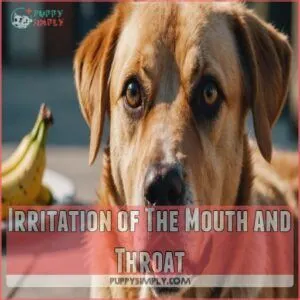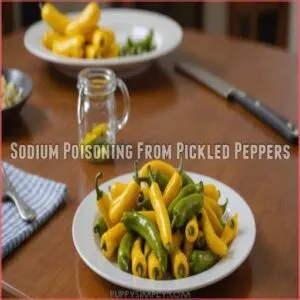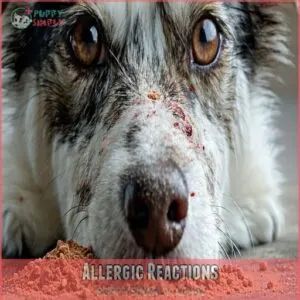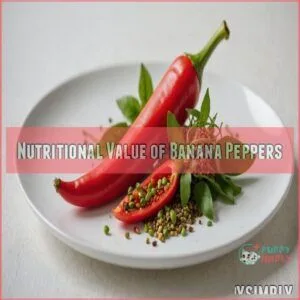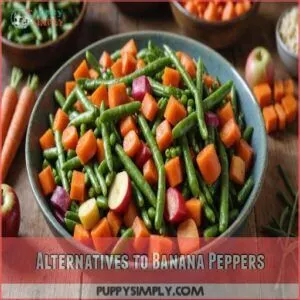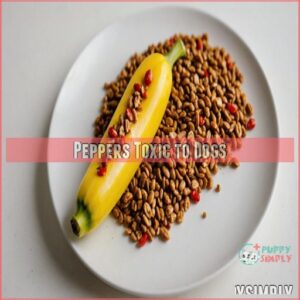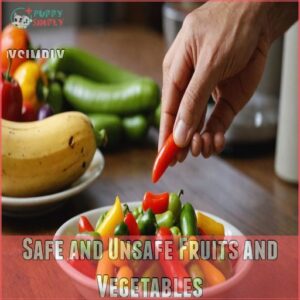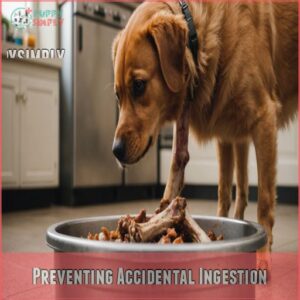This site is supported by our readers. We may earn a commission, at no cost to you, if you purchase through links.

While banana peppers aren’t downright toxic, they contain capsaicin, which can upset your pup’s stomach and lead to gastrointestinal adventures you’d rather avoid.
The mildest ones might be okay in tiny amounts, but don’t make it a habit.
You’ll want to avoid the pickled variety due to high sodium levels that can spell trouble for Fido.
Think of banana peppers as more of a feisty garnish rather than a steady diet for your canine companion.
Curious about safer snack alternatives? We’ve got that covered, too.
Table Of Contents
- Key Takeaways
- Banana Peppers and Dogs
- Risks of Feeding Banana Peppers
- Nutritional Value of Banana Peppers
- Alternatives to Banana Peppers
- Peppers Toxic to Dogs
- Safe and Unsafe Fruits and Vegetables
- Preventing Accidental Ingestion
- Frequently Asked Questions (FAQs)
- Can dogs eat bananas?
- Can dogs eat fruits & vegetables?
- Can dogs eat pears?
- Can dogs eat cucumbers?
- What happens if my dog ate a banana pepper?
- Are any peppers toxic to dogs?
- Can dogs eat pepperoncini?
- What happens if a dog eats a ghost pepper?
- Are pickled banana peppers okay?
- How much is too much?
- What if my dog ate some?
- Are all peppers bad for dogs?
- My dog loves spicy food! Is it okay?
- Conclusion
Key Takeaways
- Feeding your dog banana peppers isn’t recommended due to the presence of capsaicin, which can upset your dog’s stomach and cause gastrointestinal issues.
- Pickled banana peppers add a high sodium level, which can be harmful and lead to salt toxicity in dogs.
- Stick to safer snack alternatives like carrots or apples to keep your dog healthy and happy.
- Always consult your vet before introducing new foods into your dog’s diet to avoid potential health risks.
Banana Peppers and Dogs
Banana peppers might add a zesty kick to your salad, but they aren’t the best choice for your dog’s palate.
With capsaicin lurking in these peppers, even a tiny taste might send your pup’s tummy on a wild roller-coaster ride.
What Are Banana Peppers
Banana peppers, with their cheery yellow hue, hail from South America, adding a mild kick to your culinary adventures.
They’re shaped like bananas, hence the name, and bring a tangy-sweet flavor profile.
Often pickled or chopped up for salads and pizzas, they offer some nutrition with vitamins and low calories.
Just like how asparagus is a low-calorie treat that’s suitable for weight management, monitoring your pup’s veggie intake.
Just watch out for your pup’s sensitive stomach!
What is Capsaicin
Ever wonder why peppers pack a punch?
The secret is capsaicin, the spicy chemical in banana peppers.
Its fiery heat units come from its chemical structure, which can spice up human dishes but cause discomfort in dogs.
Though it’s been used in everything from heat creams to bear spray, for dogs, it’s a potential source of gastrointestinal trouble.
Why Are Banana Peppers Bad for Dogs
Capsaicin in banana peppers might sound like a party; however, for dogs, it’s no fun.
Watch out for:
- Gastrointestinal distress: Dog vomiting, diarrhea, or abdominal pain could visit unexpectedly.
- If you’re looking for a safer alternative, you can consider a banana pepper dog treat.
- Sodium danger: Pickled peppers pack a salty punch.
- Pepper toxicity: Not a treat for those dog allergies.
- Excessive thirst and bloating: A recipe for discomfort.
Risks of Feeding Banana Peppers
Feeding your dog banana peppers might seem harmless, but it often leads to unpleasant surprises like stomach upset or an overwhelming thirst.
You wouldn’t want your furry friend dealing with a fiery mouth or a pickle’s sodium overload!
Gastrointestinal Upset
A little spice can be a big problem for your pup.
Those tasty banana peppers contain capsaicin, which can upset your dog’s stomach.
If you’re considering adding banana peppers to your dog’s diet, you should explore safe alternatives, such as banana pepper dog food options, to prevent any adverse reactions.
You might see dog diarrhea, vomiting in dogs, or even stomach pain.
Keep those peppers far away from your furry friend.
If you’re unsure about your canine diet, a dog vet consultation is always a good idea.
Remember, dog food safety is key.
Preventing problems is easier than dealing with them.
Excessive Thirst and Bloating
Feeding your dog banana peppers might leave them lapping water like crazy, chasing dehydration with every sip.
It’s not just the thirst; excessive water intake from sodium-laden peppers can lead to bloating and abdominal pain.
Consider kidney health when planning your pup’s diet.
Stick to dog-safe ingredients and moderate that menu to keep tails wagging and bellies content.
Irritation of The Mouth and Throat
After a gulp of water doesn’t cut it, banana peppers can pose more trouble due to mouth and throat irritation caused by capsaicin.
Sparking discomfort akin to a fiery chip challenge, it’s no joke for your dog.
- Pepper burns can lead to persistent coughing.
- A raspy bark might hint at irritation.
- Your pup may refuse food temporarily.
Sodium Poisoning From Pickled Peppers
Those spicy banana peppers might irritate a dog’s mouth, but it’s the pickling that really raises the stakes.
High sodium levels in pickled peppers can lead to salt toxicity risks.
Your pup is better off munching on dog-safe snacks or homemade dog treats.
Remember, toxic foods for dogs include salty snacks.
Stick to fruits and vegetables dogs can eat safely.
Allergic Reactions
Imagine your dog scratching like a DJ at a pet party—could be a banana pepper allergy in dogs.
Watch for symptoms like itchy skin or digestive discomfort.
These pepper-related dog food allergies mightn’t be common, but they can strike.
Consider allergy testing for dogs if you notice any telltale signs.
Better safe than sorry when treating dog allergies!
Nutritional Value of Banana Peppers
Sure, banana peppers pack a nutritional punch for humans, offering vitamins, fiber, and potassium. But as for our furry friends, the potential benefits just don’t outweigh the spicy risks.
Vitamin C and Immunity
A splash of Vitamin C in banana peppers might perk up a dog’s immune system, but don’t ditch their superhero ability to make their own.
While not needing supplements for dogs, these natural immunity boosters play a role in fending off dog allergies.
Remember, though, focus more on safe human foods like dog-safe fruits and dog-safe vegetables.
Fiber and Digestion
So, you’ve learned about Vitamin C. Now, let’s talk fiber! Banana peppers do offer some fiber, which is great for your dog’s digestive health.
Fiber helps things move along smoothly in their gut, promoting healthy digestion. It’s like a little broom sweeping things clean!
However, remember, the benefits are small compared to the risks of capsaicin. Always prioritize safe, dog-friendly snacks for your furry friend’s best gut health.
A balanced diet is key to a happy, healthy pup!
Potassium and Electrolytes
As fiber aids digestion, think of banana peppers as a quirky electrolyte source.
They pack potassium, a key player in maintaining your dog’s electrolyte balance, which is particularly important for dogs with kidney issues that may benefit from a low-phosphorus diet.
Without it, you might notice muscle cramps or hydration issues that even sports drinks can’t remedy.
While dogs benefit from potassium for protein and carbohydrate metabolism, the risks often outweigh the fun.
Low-Calorie Snack Option
Leaping from potassium’s benefits, let’s explore banana peppers as a low-calorie snack.
They’re great for weight management, offering a healthy treat without the guilt.
Before reaching for these peppers, remember:
- Dog weight management can be challenging.
- Can dogs eat banana peppers? Generally, no.
- Dog wellness requires being cautious with spicy foods like salsa, which contains onions and garlic that can cause anemia and red blood cell damage. Dog wellness requires safe dog snacks that won’t harm them.
Choose wisely!
Alternatives to Banana Peppers
If you’re thinking about safer snacks for your dog, skip the banana peppers and try offering carrots or apples instead.
Always check with your vet to tailor these treats to your pet’s needs, avoiding any culinary adventures your dog’s stomach mightn’t appreciate.
Safe Fruits for Dogs
Nutritionally, banana peppers have perks, but safe fruits are the way to go for your furry pal.
Packed with vitamins and antioxidants, apples and blueberries are top contenders.
They’re not just flavorful; these fruits keep your dog’s tail wagging with health benefits.
| Fruit | Benefits | Portion Size |
|---|---|---|
| Apples | Fiber, low calorie | 1-2 slices |
| Blueberries | Antioxidants, vitamin C | A handful |
| Mango | Vitamins A, C | 2-3 small pieces |
Safe Vegetables for Dogs
Spotting safe vegetables for your furry friend? Try offering broccoli, carrots, or green beans—perfect choices from a safe vegetables list.
These veggies are delightful dog-friendly snacks without veggie dangers.
Just steer clear of onions, asparagus, and leeks, which appear on the vegetables dogs can’t eat list.
Remember, a healthy dog treat can be just a crunchy carrot stick away!
Healthy Snack Options
If you’re exploring tasty, dog-safe treats, think about these homemade snacks instead of spicy banana peppers. Consider:
- Carrots: Crunchy and safe, they’re a hit with most pups.
- Apples: Just remove the seeds and core for a sweet, healthy snack.
- Plain cooked chicken: Protein-rich and satisfying.
Remember, keep an eye on snacking frequency and portion sizes for happy, healthy pups.
Importance of Veterinary Consultation
Why gamble with your pup’s health?
Before switching up your dog’s diet, especially with potential allergens like banana peppers, chat with your vet.
They can help tailor a plan to meet your dog’s specific dietary needs, considering the potential risks of certain dog treats like chorizo high fat content, and address any dog health concerns, including potential dog food allergies.
Remember, vet-approved treats are key for Pet food safety!
A quick call guarantees peace of mind and a happy, healthy dog.
Peppers Toxic to Dogs
Regarding peppers, not all are dog-friendly; some can cause serious discomfort or even toxicity.
Understanding which peppers to avoid keeps your furry friend’s tail wagging and avoids any unwanted vet visits.
Types of Peppers to Avoid
Dogs and spicy don’t mix well, so let’s talk peppers you should avoid.
Jalapeno peppers can cause discomfort, and chili peppers might make your pup’s day worse.
Even bell peppers, though less spicy, can irritate sensitive tummies.
Stay clear of cayenne peppers and habanero peppers—they pack a punch too fiery for your furry friend.
Keep those scorching peppers off the menu!
Symptoms of Pepper Toxicity
Spotting symptoms of pepper toxicity in your furry friend keeps you one step ahead.
Dogs might become a bit theatrical with:
- Dog Vomiting all over your favorite rug. If your dog is frequently vomiting, consider trying gentle ingredients like boiled chicken and white rice, which are great for soothing upset stomachs, as seen in some dog food for dogs with vomiting.
- Diarrhea when you least expect it.
- Stomach Pain that leaves them whining.
- Excessive Thirst, like they’ve run a marathon.
- Mouth Irritation, making them paw at their face.
Stay alert to these signs!
What to Do if Your Dog Eats a Pepper
So, Fido munched on a rogue pepper, huh? It’s time to act. Monitor symptoms like vomiting and diarrhea. Don’t freak out; instead, call your vet if things seem off—better safe than sorry. Remember, peppers might cause discomfort.
| Symptom | Action |
|---|---|
| Vomiting | Contact Vet |
| Diarrhea | Increase Fluids |
| Excessive Drool | Call Vet |
Safe and Unsafe Fruits and Vegetables
You might think anything from the produce aisle is safe for your dog, but certain fruits and vegetables can be hazardous.
Grapes and onions, for example, can be harmful, so it’s important to know which snacks are safe to share.
Unsafe Fruits for Dogs
In the wild world of fruits, not all are friendly to Rover’s tummy!
Avoid giving your furry friend grapes, raisins, cherries, and avocados—these can lead to serious health issues.
Mushrooms, especially wild ones, are also a no-go.
Keep these potentially dangerous fruits out of their reach, preventing any accidental munching misadventures that could spell trouble for your pet.
Unsafe Vegetables for Dogs
Knowing what veggies to avoid is key to keeping your furry friend healthy.
Some garden goodies are no-nos!
Here’s a quick guide to unsafe veggies for dogs:
- Onion toxicity: A serious threat.
- Garlic dangers: Can cause anemia.
- Leek risks: Similar to onions and garlic.
- Chive hazards: Another member of the allium family.
- Mushroom concerns: Some are deadly poisonous.
Keep these off your dog’s menu to prevent trouble!
Preventing Accidental Ingestion
To prevent your pup from snacking on banana peppers, make sure you supervise their diet closely while pet-proofing your home.
Store any potentially toxic foods safely out of reach and eliminate choking hazards to keep your dog’s dining experience worry-free—and your floor clean from any enthusiastic taste-testing.
Supervising Your Dog’s Diet
Ensuring your pup’s snacks are safe isn’t just about choosing the right fruits and veggies.
Keep an eye on their diet to dodge any unwanted surprises.
Dogs can stumble upon things they shouldn’t eat, like banana peppers, which might mess with their tummy.
Stick to homemade dog treats and follow a feeding schedule.
Pet food safety is key to preventing those sneaky nibbles!
Removing Choking Hazards
Supervising what your dog eats helps, but watch out for choking hazards, too.
Size matters—keep treats small to prevent mishaps.
- Cut treats into bite-sized pieces.
- Pick safe chew toys over bones or rawhide.
- Regularly check your dog’s toys for wear and tear.
- Ensure treats are appropriate for your dog’s size.
These steps make homes safer for your canine companion.
Storing Toxic Foods Safely
Guarding your pooch from accidental munching is easier than you think.
Use food storage containers to stash those spicy banana peppers safely.
Learn more about safe pepper storage by understanding what peppers are safe for dogs.
Keep countertops clear to thwart curious snouts and employ secure cabinets for peace of mind.
A well-organized fridge also helps prevent pup mischief.
Think of it as pet-proofing your kitchen to guarantee both furry and human safety.
Pet-Proofing Your Home
You’re not the only one who’s had a dog turn the house into a buffet!
Transform your space into a fortress of safety with pet-proof cabinets and child locks.
Hide those toxic plants out of reach, and consider chew-proof furniture to stop those curious munchers.
Unearth hidden hazards lurking in plain sight, ensuring your furry friend stays out of harm’s way.
Frequently Asked Questions (FAQs)
Can dogs eat bananas?
Nearly 90% of Americans enjoy bananas, and your dog can too!
They’re safe for most dogs, offering vitamins, fiber, and potassium.
Just don’t go bananas; offer slices to avoid tummy troubles and keep tail wags healthy.
Can dogs eat fruits & vegetables?
Dogs can enjoy fruits like apples and bananas, but steer clear of grapes and avocados.
Veggies like carrots and green beans are safe, while onions and garlic are not.
Always check with your vet before trying new snacks.
Can dogs eat pears?
Pears are safe for dogs in moderation.
They provide vitamins A and C, but remove seeds and core first as they contain harmful cyanide.
Always cut pears into bite-sized pieces to prevent choking hazards.
Can dogs eat cucumbers?
Sure, your dog can munch on cucumbers.
They’re a crunchy, low-calorie treat filled with vitamins.
Just slice them into manageable pieces.
But keep an eye on your pup for any odd reactions, and don’t overfeed.
What happens if my dog ate a banana pepper?
About 33% of dogs might experience tummy troubles from capsaicin in banana peppers.
Your pup could face symptoms like vomiting or diarrhea.
If reactions occur, plenty of water and a call to the vet are wise steps.
Are any peppers toxic to dogs?
While no peppers are outright toxic to dogs, capsaicin in spicy varieties like jalapeños can upset their stomachs.
Bell peppers are safer, offering vitamins without the heat.
Always introduce new foods slowly to avoid surprises.
Can dogs eat pepperoncini?
Pepperoncini peppers aren’t great for your pup. They contain capsaicin, which can upset their tummy. Stick to safer snacks like carrots or apples; your dog will thank you!
What happens if a dog eats a ghost pepper?
Imagine a firestorm in your dog’s belly—a ghost pepper’s intense capsaicin triggers severe pain, vomiting, and diarrhea.
It may burn their mouth and throat, leading to drooling and distress.
Seek veterinary help immediately.
Are pickled banana peppers okay?
Pickled banana peppers aren’t ideal for dogs due to high sodium levels, which can cause harm.
The capsaicin might lead to digestive issues.
It’s best to skip sharing these spicy snacks and keep your pup’s health in check.
How much is too much?
Feeding your dog banana peppers poses risks.
Even a small amount can cause stomach issues or discomfort.
If you notice any signs of distress like vomiting or diarrhea, it’s definitely too much.
Stick to safer treats!
What if my dog ate some?
If your dog gobbled up banana peppers, watch for tummy troubles like vomiting or diarrhea.
Offer water to soothe any irritation, and contact your vet if symptoms persist.
A little pepper isn’t the end of the world!
Are all peppers bad for dogs?
Not every pepper poses a threat to your furry friend, but it’s best to err on the side of caution.
While some peppers can be mild, the capsaicin in others may cause discomfort and gastrointestinal issues in dogs.
My dog loves spicy food! Is it okay?
Sure, your dog might love spicy food, but it can upset their stomach and cause issues like vomiting or diarrhea.
Stick to milder, dog-safe treats.
Better safe than sorry with canine cuisine!
Conclusion
So, there you have it! Can dogs eat banana peppers? The short answer is: it’s best to avoid them.
Remember that even mild banana peppers contain capsaicin, which can upset your dog’s tummy. Pickled varieties are even worse due to high sodium.
Stick to safer snacks like carrots or apples. If you’re ever unsure about a food, always check with your vet.
Keeping your pup healthy and happy is the goal, and avoiding those sneaky can dogs eat banana peppers moments is a big part of it! After all, a healthy dog is a happy dog!




